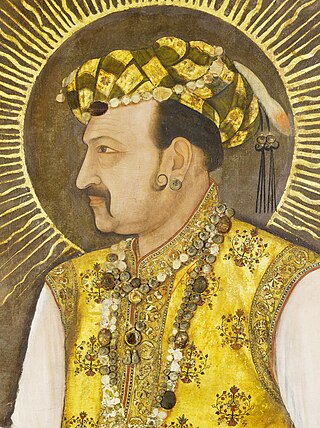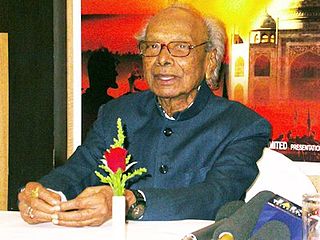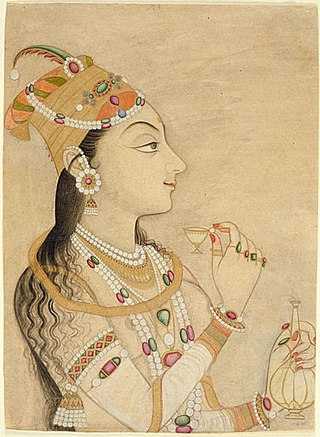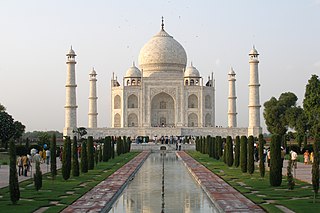
Nur-ud-din Muhammad Salim, known by his imperial name Jahangir, was Emperor of Hindustan from 1605 until his death in 1627, and the fourth Mughal Emperor.

Mirza Shahab-ud-Din Muhammad Khurram, commonly called Shah Jahan I, also called Shah Jahan the Magnificent, was Emperor of Hindustan from 1628 until his deposition in 1658. As the fifth Mughal emperor, his reign marked the zenith of Mughal architectural and cultural achievements.

The Taj Mahal is an ivory-white marble mausoleum on the right bank of the river Yamuna in Agra, Uttar Pradesh, India. It was commissioned in 1631 by the fifth Mughal emperor, Shah Jahan to house the tomb of his beloved wife, Mumtaz Mahal; it also houses the tomb of Shah Jahan himself. The tomb is the centrepiece of a 17-hectare (42-acre) complex, which includes a mosque and a guest house, and is set in formal gardens bounded on three sides by a crenellated wall.

Naushad Ali was an Indian composer for Hindi films. He is widely considered to be one of the greatest and foremost music directors of the Hindi film industry. He is particularly known for popularising the use of classical music in films.

Mumtaz Mahal was the empress consort of Mughal Empire from 1628 to 1631 as the chief consort of the fifth Mughal emperor, Shah Jahan. The Taj Mahal in Agra, often cited as one of the Wonders of the World, was commissioned by her husband to act as her tomb.

Nur Jahan, born Mehr-un-Nissa was the twentieth wife and chief consort of the Mughal emperor Jahangir.

The Agra Fort is a historical fort in the city of Agra, also known as Agra's Red Fort. Mughal emperor Humayun was crowned at this fort in 1530. It was later renovated by the Mughal emperor Akbar from 1565 and the present-day structure was completed in 1573. It served as the main residence of the rulers of the Mughal dynasty until 1638, when the capital was shifted from Agra to Delhi. It was also known as the "Lal-Qila" or "Qila-i-Akbari". Before being captured by the British, the last Indian rulers to have occupied it were the Marathas. In 1983, the Agra fort was inscribed as a UNESCO World Heritage Site because of its importance during Mughal rule. It is about 2.5 kilometers (1.6 mi) northwest of its more famous sister monument, the Taj Mahal. The fort can be more accurately described as a walled city. It was later renovated by Shah Jahan.

Mirza Ghiyas Beg, also known by his title of I'timad-ud-Daulah, was an important official in the Mughal Empire, whose children served as wives, mothers, and generals of the Mughal emperors.

The Taj Mahal represents the finest and most sophisticated example of Indo-Islamic architecture. Its origins lie in the moving circumstances of its commission and the culture and history of an Islamic Mughal empire's rule of large parts of India. The distraught Mughal Emperor Shah Jahan commissioned the project upon the death of one of his favorite wives Mumtaz Mahal.
Sonya Rizvi, better known by her stage name Sonya Jehan, is a Pakistani film actress who predominantly works in Urdu and Hindi-language films. She is the granddaughter of legendary singer Noor Jehan and filmmaker Shaukat Hussain Rizvi. Jehan is known for portraying supporting roles in several critically acclaimed films, including the Indian drama My Name Is Khan (2010), the English-language political thriller The Reluctant Fundamentalist (2012) and the coming-of-age musical drama Pakistani film Ho Mann Jahaan (2015). Her role in the last of these earned her a Nigar Award for Best Supporting Actress nomination.

Akbar Khan is an Indian actor, screenwriter, film producer and director. He is the youngest brother of the Indian actor, producer, editor and director, Feroz Khan and Sanjay Khan.

Taj Mahal is a 1963 film based on the historical legend of the Mughal emperor Shah Jahan, who built the Taj Mahal in fond remembrance and as a tomb for his beloved wife Mumtaz Mahal.

Abu'l-Hasan entitled by the Mughal emperor Jahangir as Asaf Khan, was the Grand Vizier of the fifth Mughal emperor Shah Jahan. He previously served as the vakil of Jahangir. Asaf Khan is perhaps best known for being the father of Arjumand Banu Begum, the chief consort of Shah Jahan and the older brother of Empress Nur Jahan, and the maternal grandfather of mughal emperor Aurangzeb.

Manavati Bai, also spelled Manvati Bai,, better known by her title, Jagat Gosain, was the second wife and the empress consort of the fourth Mughal emperor Jahangir and the mother of his successor, Shah Jahan.
The Black Taj Mahal is a legendary black marble mausoleum that is said to have been planned to be built across the Yamuna River opposite the Taj Mahal in Agra, Uttar Pradesh, India. Mughal emperor Shah Jahan is said to have desired a mausoleum for himself similar to that of the one he had built in memory of his second wife, Mumtaz Mahal.
Vaquar Shaikh is an Indian television actor. He played Rashid Ahmed Khan in Qubool Hai and has appeared in serials like Justujoo and Pradhanmantri.

Persian Inscriptions on Indian Monuments is a book written in Persian by Dr Ali Asghar Hekmat E Shirazi and published in 1956 and 1958 and 2013. New edition contains the Persian texts of more than 200 epigraphical inscriptions found on historical monuments in India, many of which are currently listed as national heritage sites or registered as UNESCO world heritage, published in Persian; an English edition is also being printed.
Kandahari Begum was the first wife of the Mughal emperor Shah Jahan and the mother of his first child, Princess Parhez Banu Begum.
Siyaasat is a 2014 Indian fictional drama which aired on The EPIC Channel. The series is an adaptation of the popular 2002 award-winning fictional novel The Twentieth Wife by author Indu Sundaresan.
Hur-ul-Nisa was a Mughal princess, the first daughter of Mughal Emperor, Shah Jahan and his chief consort, Mumtaz Mahal.














